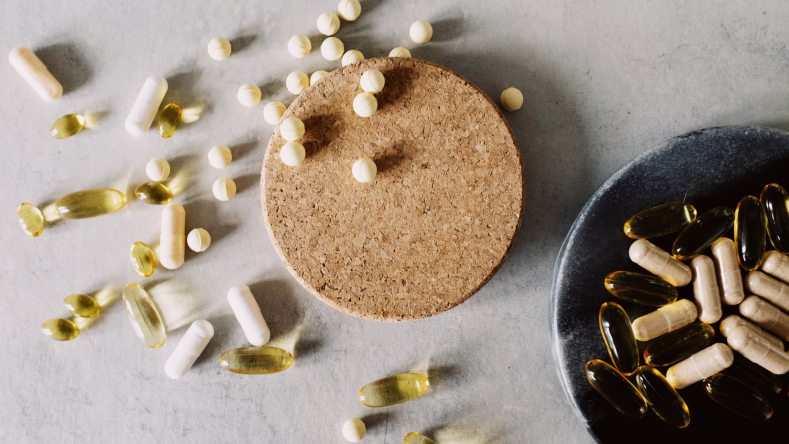What are the 3 most important vitamins?
This question is about Nutrition
Although all vitamins are essential and serve unique and important functions in the body, many health experts would agree that the three most important vitamins are vitamin D, B12, and iron. These crucial nutrients are essential for good health, and deficiencies are either common and/or can have severe consequences.
Vitamin D
Vitamin D is found in nearly all (if not all) cells in the body, and plays important roles in bone health, calcium absorption, blood sugar regulation, cell proliferation and turnover, and immune function. Optimizing your vitamin D level may even help protect against severe COVID-19, type 2 diabetes, depression, as well as some autoimmune diseases, neurodegenerative diseases, and cancers [ 1 2 3 4 5
For more on why vitamin D is so important, read What is the most important vitamin for your body?
Vitamin B12
Vitamin B12 aids in keeping your body’s blood and nerve cells healthy and helps make DNA, the genetic material in all of your cells. Vitamin B12 deficiency can have a significant impact on health,including anemia (a blood condition that makes you weak and tired), heart palpitations, pale skin, GI distress, nerve problems, and more [ 6
Vitamin B12 is found naturally in a variety of animal foods like fish, meat, poultry, eggs, and dairy, and is also added to some fortified foods like breakfast cereals, nutritional yeast, and plant-based dairy alternatives. As you get older, it can be hard to absorb enough vitamin B12 from the food you eat, so individuals over 50 should get most of their vitamin B12 from fortified foods or supplements.
Iron
Your body needs iron to make hemoglobin (red blood cells) and myoglobin (found in muscles), which are two proteins that are responsible for providing oxygen to all cells and tissues throughout the body. Iron is also needed to make certain hormones, such as erythroferrone and hepcidin, to aid in its distribution throughout the body and absorption from food. There are two sources of iron – heme and non heme – which can be obtained through diet. Heme is easily absorbed and can be found only in animal flesh like meat, poultry, and seafood, whereas non-heme iron is obtained with plant foods (such as whole grains, nuts, seeds, legumes, and leafy greens).
Iron deficiency is common, particularly among women and athletes who have increased needs. Inadequate iron intake can cause iron-deficiency anemia, a condition characterized by reduced oxygen-carrying capacity, fatigue, shortness of breath, dizziness, and poor immune function. Iron deficiency, with or without anemia, can impair muscle function and limit work capacity and athletic performance by impacting oxygen transport to muscles [ 7
Adequate iron intake is essential to your overall health and wellbeing. Good sources of heme iron include shellfish (particularly clams, muscles, and oysters), beef, sardines, and liver. Spinach, beans, lentils, fortified cereal and bread, are good sources of non-heme iron, which is best absorbed when consumed alongside vitamin C.
If you’re supplementing with iron, or have low iron levels, here’s how to take iron supplements for best absorption.

People also ask:
References
Demir, M., Demir, F., & Aygun, H. (2021). Vitamin D deficiency is associated with COVID-19 positivity and severity of the disease. Journal of medical virology, 93(5), 2992–2999.
https://doi.org/10.1002/jmv.26832
Kayaniyil, S., Vieth, R., Retnakaran, R., Knight, J. A., Qi, Y., Gerstein, H. C., Perkins, B. A., Harris, S. B., Zinman, B., & Hanley, A. J. (2010). Association of vitamin D with insulin resistance and beta-cell dysfunction in subjects at risk for type 2 diabetes. Diabetes care, 33(6), 1379–1381.
https://doi.org/10.2337/dc09-2321
Examine.com. (2019, April). A D-fence against cancer?
https://examine.com/members/deep-dives/article/a-d-fence-against-cancer/
Yang, C. Y., Leung, P. S., Adamopoulos, I. E., & Gershwin, M. E. (2013). The implication of vitamin D and autoimmunity: a comprehensive review. Clinical reviews in allergy & immunology, 45(2), 217–226.
https://doi.org/10.1007/s12016-013-8361-3
Groves, N. J., McGrath, J. J., & Burne, T. H. (2014). Vitamin D as a neurosteroid affecting the developing and adult brain. Annual review of nutrition, 34, 117–141.
https://doi.org/10.1146/annurev-nutr-071813-105557
Office of Dietary Supplements - Vitamin B12. (2021, April 6). Office of Dietary Supplements — NIH. Retrieved November 19, 2021, from
https://ods.od.nih.gov/factsheets/VitaminB12-HealthProfessional/#h2
Thomas, D. T., Erdman, K. A., & Burke, L. M. (2016). Position of the Academy of Nutrition and Dietetics, Dietitians of Canada, and the American College of Sports Medicine: Nutrition and Athletic Performance. Journal of the Academy of Nutrition and Dietetics, 116(3), 501–528.
https://doi.org/10.1016/j.jand.2015.12.006
\n
"}}]}